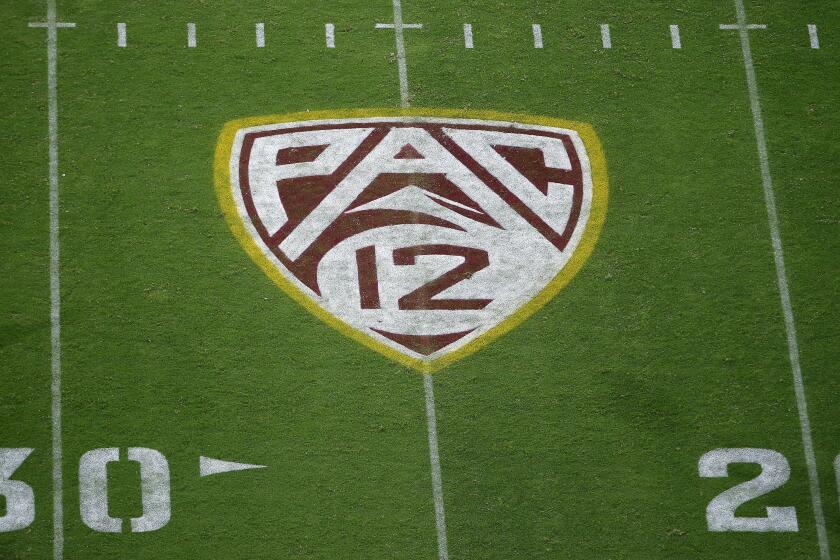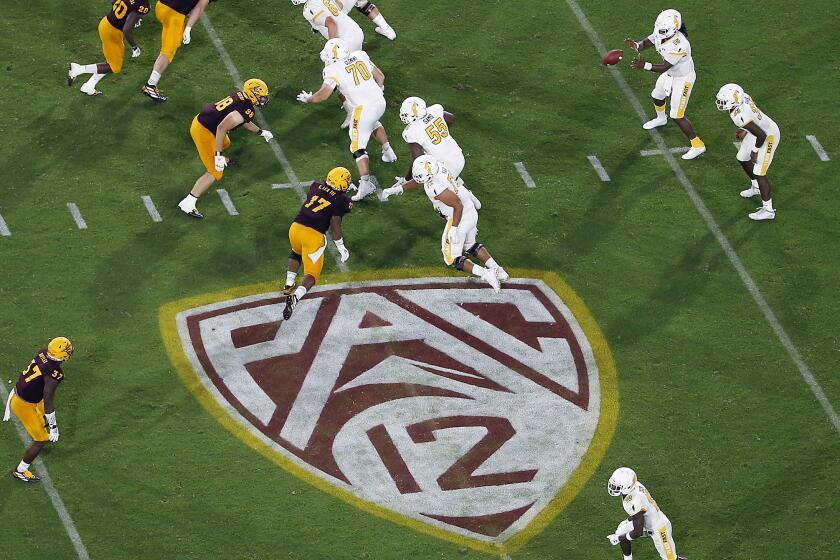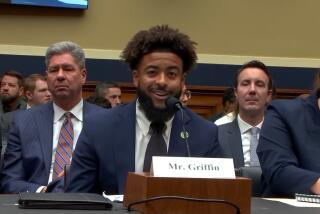Ex-players with activist history root for Pac-12 group to succeed with demands
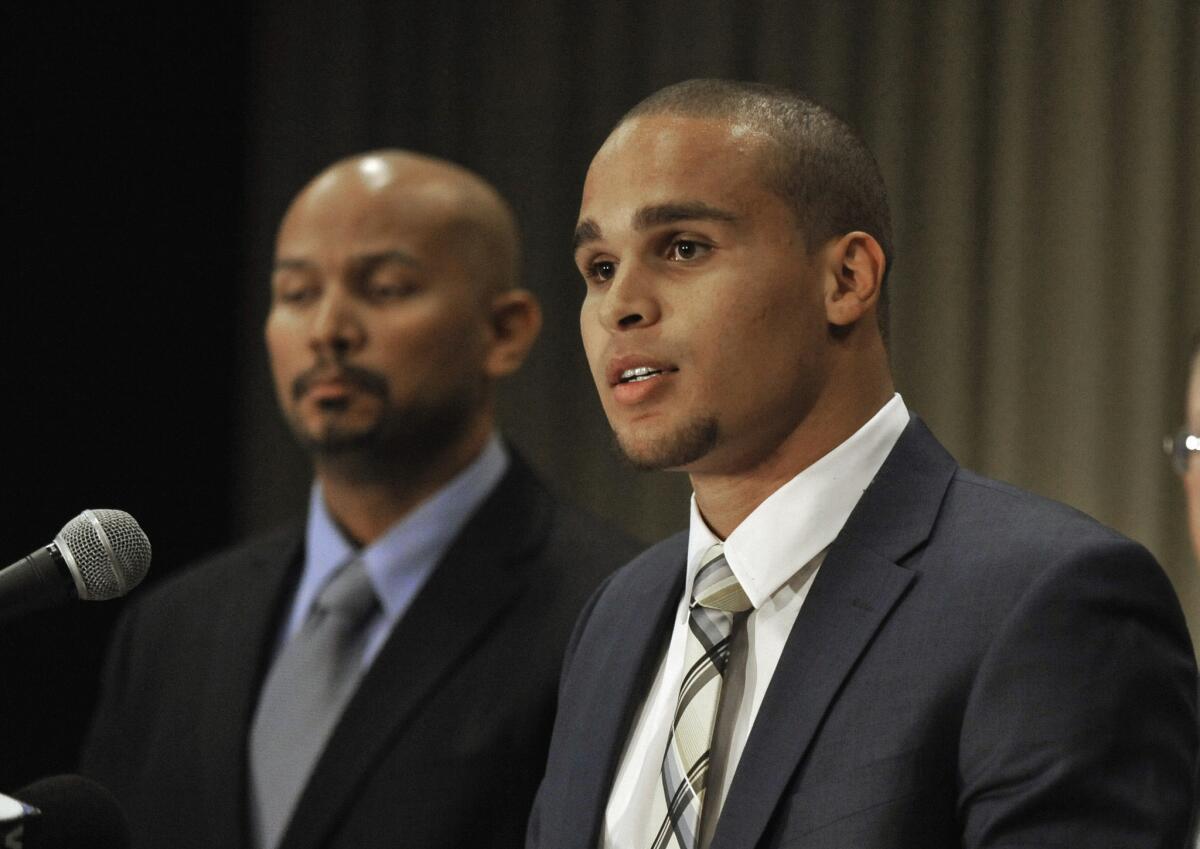
- Share via
Nearly five years after Kain Colter’s push to organize Northwestern football players into a formally recognized union fell short at the goal line, the former quarterback received a Sunday morning message that brought fresh inspiration toward a cause that will be forever dear to him.
Players from across the Pac-12 had banded together to make demands of the conference and its member schools, which are asking them to compete in football practices and games in the midst of a pandemic without offering anything extra for assuming the risk. If the demands aren’t met, the players would opt not to play, threatening the schools’ ability to cash in on large television audiences at a time when athletic departments are afraid for their financial futures.
While processing the news, Colter recalled that the Wildcats’ attempt to have the National Labor Relations Board recognize them as employees of the university, rather than students, was rejected in part because Northwestern was just one school in a conference of 14. The board did not want to add too much instability within the larger system.
“I can’t speak highly enough of the players and how impactful this is,” Colter said, “that it’s not only a school basis, which was kind of a problem in our case. This is conference-wide collective action. It’s unprecedented.”
Colter wasn’t alone in marveling at the scope. It has also been about five years since Ian Simon was one of the leaders of the Missouri football team’s boycott amid racial strife on campus that led to the resignation of the university system president, Tim Wolfe, after two days. Simon was in the car on the way to work Monday morning listening to the radio when he heard about college football players’ latest flex of their leverage.
A group of Pac-12 football players issue a list of demands and threaten to boycott season. It’s time for colleges to take notice and help the players.
Simon noted one big difference: Missouri players went right back to football once Wolfe resigned. They never had to sit a game. Right now, about a dozen Pac-12 players have put their name to backing the demands. References have been made to there being a group chat involving hundreds of players across the conference, and if many of them were to opt out, that would send chills down the spine of college sports administrators across the country.
“We were asking for one person to be removed,” Simon said. “They’re trying to dismantle an entire system. It’s a monumental task. Honestly, I believe it can be done. It should be done. But it’s going to test your patience. It’s going to test how bad you really want it. It’s going to take a lot of willpower. There’s going to be a whole lot of people that you thought had your back that aren’t going to have your back.”
The players, who now have at least one named representative from each school other than Colorado, requested a meeting with Pac-12 Commissioner Larry Scott in a letter sent Sunday night. As part of their public demands, they had asked for a substantial pay cut for Scott, league athletic directors and coaches to “eliminate excessive expenditures” that could help protect non-revenue sports and offset a request for 50% of conference revenues to be shared among players.
Scott responded with a letter sent late Monday afternoon in which he expressed openness to having a dialogue about their issues later this week, after talking with league members.
In the letter, Scott pointed to the Pac-12’s decision to guarantee the scholarship and team standing of any players who opted out due to COVID-19. He also said the league supports the passage of a one-time transfer waiver, along with name, image and likeness rights, which are expected to be granted to players in January 2021.
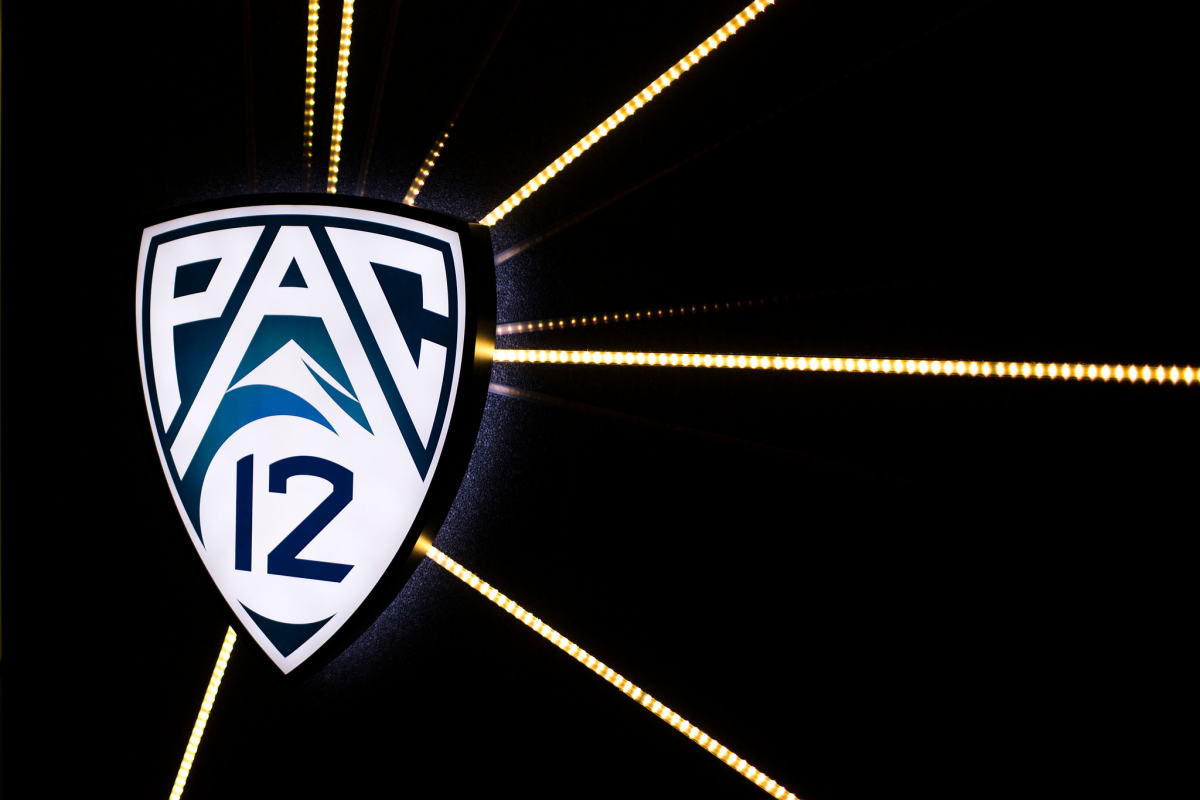
Some of the players’ economic demands, including six-year scholarships for degree completion and guaranteed medical expense coverage for six years after college athletic eligibility ends, make sense to those who see tens of millions of dollars pour into athletic departments on a yearly basis.
But then there is the mandate for 50% of revenues.
“This is either a classic overreach or a fundamental misunderstanding of the economics of college sports, or likely both, on their part and of those that are representing them,” said David Carter, a USC sports business professor. “I think oftentimes you are trying to make a broader point, whether it makes economic sense or not, and this is a time when they believe they have some running room to try to effect change. This kind of change is completely unworkable, though.”
Carter pointed out that football and men’s basketball subsidize the other sports within college athletic departments, many of which run annual deficits in the million-dollar range.
“If they were hypothetically to get any share of revenue,” Carter said of the football players, “the impact on low or non-revenue sports — especially Olympic sports and women’s sports — would be substantial and many respects legally that can’t happen” because of Title IX requirements tied to funding women’s sports.
“If any part of that revenue share was instituted, it would forever re-shape the business of college sports and how revenue flows and would have huge impacts on facilities, on scholarship opportunities, all the way down.”
To Ellen Staurowsky, a sports management professor at Drexel’s LeBow College of Business,
using Title IX as a reason to not pay athletes in revenue sports is “a political convenience” and “a scare tactic.”
While Title IX is meant to ensure that athletic opportunities are proportionate to the student body population, a study released in January by the Women’s Sports Foundation found that 87% of NCAA schools across the three divisions offer disproportionately higher athletic opportunities to men compared with enrollment.
Thirteen Pac-12 football players released demands intended to protect them amid the COVID-19 pandemic and racial injustice that have roiled the country.
Colter views this current moment, with the intersection of Black Lives Matter, COVID-19 and mostly-Black major college football players being used as guinea pigs for the upcoming return of normal students to campus, as potentially perfect for the players to achieve some results. There may never be more sympathy for their platform.
“I would like to see this momentum building and players from other conferences organizing on that basis, discussing the issues that were addressed by players in the Pac-12,” said Colter, who has continued to work as a labor union organizer after his playing career ended. “Their list of demands was extremely significant and meaningful and reasonable and can certainly be accomplished.”
Simon understands better than anyone what these players are risking. A starting safety and team captain at Missouri, he remembers that the first question he heard from any NFL scouting staff was usually about the Tigers’ boycott. When asked whether he would do it again, he said he did not hesitate in saying he would always try to do what’s right. Simon believes he was not given a fair shake in the NFL draft because of it.
“That was my dream, but I wouldn’t change anything I did for the world,” said Simon, who after graduation worked in waste management before finding a job at a medical office.
Thinking back, Simon can’t believe what he and his teammates were able to pull off. He hopes the Pac-12 players are ready to dig in.
“It’s still crazy to me,” Simon said. “It only took 48 hours. When you’re in that situation, it felt like a lifetime. It’s just a testament to understanding what you’re worth to these schools.”
More to Read
Go beyond the scoreboard
Get the latest on L.A.'s teams in the daily Sports Report newsletter.
You may occasionally receive promotional content from the Los Angeles Times.
